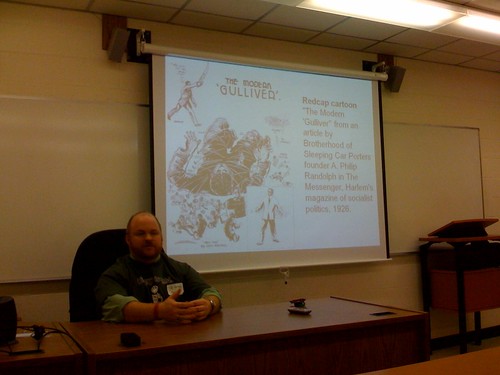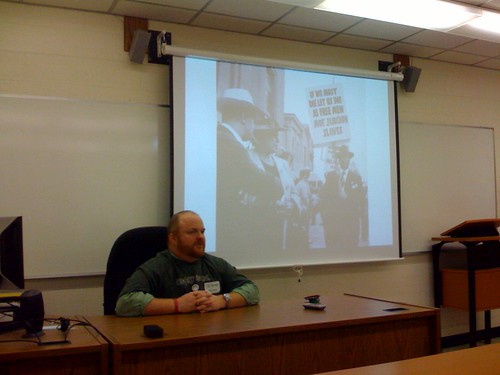These are my notes from Greg Oppel’s presentation “A. Philip Randolph: Service Not Servitude” at the Oklahoma Council for History Education symposium at the University of Central Oklahoma (in Edmond) on 6 December 2008. MY THOUGHTS AND REFLECTIONS ARE IN ALL CAPS. I recorded this session on Ustream.
HERE IS THE WIKIPEDIA ARTICLE LINK FOR A. PHILIP RANDOLPH:
Asa Philip Randolph (April 15, 1889 – May 16, 1979) was a prominent twentieth century African-American civil rights leader and founder of the Brotherhood of Sleeping Car Porters, which was a huge achievement for labor and especially for African-American labor organizing.
Greg is passionate about sharing presentations like this about people who may not be included now in “the canon” of history personalities but SHOULD be included
– A. Philip Randolph is one of the people who Greg puts in this category
Movie “10,000 Black Men Named George” (NetFlix link)
Unions were segregated in the Gilded Age
– Randolph
Many of these resources are from the museum for Randolph in his museum in Chicago
When I use PowerPoint, it means I am using a lot of images, maps, and working to engage my students with historical documents
Porters become like the house servants in the age of slavery
– Pullman Porters were the luxury cars on trains
– interiors of these cars were very fancy
– in this time period, trains were the primary mode of transportation
– there is a Pullman car at our Oklahoma Science Museum now, check it out
Other train cars were not enclosed, so riders got filthy dirty riding them
“Third Class Carriage” book addresses this (author?)
Students today
– restaurant Jamils has professionally trained waiters
The motto of the Brotherhood of Sleeping Car Porters was “Fight or Be Slaves”
Founding of the Union
– Pullman Porters organized and founded the Brotherhood in 1925
– BSCP was the very first African-American labor union to sign a collective bargaining agreement with a major U.S. corporation
– A. Philip Randolph was the determined, dedicated and articulate president of this union who fought to improve the working conditions and pay for the Pullman Porters
Other slogans: “On the job every second” and “Railroad work is vital to victory!”
– reference to World War II?
Cartoon referencing “The Modern Gulliver”
– “Uncle Toms and Stool Pidgeons”
– Randolph is in the upper left corner holding a sword, labeled “Union”
“If we must die let us die as free men not Jim Crow slaves”
Were doing document analysis of photos like this: (shows Randolph carrying a protest sign
The idea that there are classes and differences of opinions between classes is something that is foreign to many of our students
Question from the audience, to what degree can our students today relate to this history?
– discussion about black/African-American students resenting a white teacher talking about black figures from history, Bill Cosby and his dialog with the black community over the past five years
Audience member: You can compare Randolph to Cesar Chavez, and also tie in Indian issues
Randolph was brought in to advise the U.S. government as a labor leader
Labor March on Washington from 1941
– preceded famous 1963 march on Washington, which Randolph helped organize
Blacks couldn’t get FHA loans after WWII
– in some cases here in OKC, white people bought the land because blacks couldn’t
Photo of Randolph testifying before Congress in 1948 against segregation in the U.S. Army
Opening remarks for 1963 civil right’s march on Washington were by Randolph
Technorati Tags:
philip, randolph, history, civilrights, labor, unitedstates
If you enjoyed this post and found it useful, subscribe to Wes’ free newsletter. Check out Wes’ video tutorial library, “Playing with Media.” Information about more ways to learn with Dr. Wesley Fryer are available on wesfryer.com/after.
On this day..
- Snow Day in OKC: An iMovie Trailer and iMovie Theater Adventure – 2013
- Setting Up Blogging Buddies with KidBlog, Excel and a Google Spreadsheet – 2012
- Ask Your School Board Members to Take Your State Standardized Tests – 2011
- Amazing Musical Creativity on an iPhone Guitar & iPad Drum Set #edapp – 2010
- Six years of 1 to 1 learning in Floydada, Texas – 2010
- Why are URL shorteners blocked by some content filters, websites, and wifi providers? – 2009
- Using the Dialectial journal to Read Biography and Historical Novels – 2008
- Toussaint Louverture and the Haitian Revolution – 2008
- Links for today’s Pearl Harbor webcast / videoconference – 2007
- A Phenomenal Day of Learning at Pearl Harbor and in Honolulu – 2007



Comments
One response to “A. Philip Randolph: Service Not Servitude”
[…] Oppel and his presentation on December 6th at the Oklahoma Council for History Education symposium, “A. Philip Randolph: Service Not Servitude,” my wife and I watched the NetFlix movie “10,000 Black Men Named George” this […]